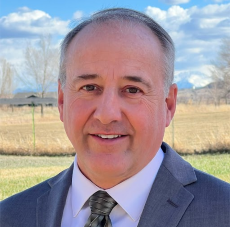
Updates from the State Engineer
On Tuesday, July 16, newly appointed state engineer Jason Ullmann joined the Colorado River District Board of Directors at their third quarterly meeting of 2024 to introduce himself, provide updates on the work of the state engineer’s office, and answer the directors’ questions.
Before his appointment to the position of State Engineer and Division of Water Resources Director in March of this year, Ullmann lived and worked on the western slope of Colorado for 18 years. He spent time as a city engineer for the City of Montrose, a consulting engineer, and 11 years as the Assistant Division Engineer for Division 4. While he said he was very sad to be leaving the community of Montrose, he is looking forward to working on water issues across the state.
“It is a challenging position,” said Ullmann about the work of state engineer. “Managing and stewarding the priority system along with well permits, dam safety, and water administration. But one of the great things about being a part of the Division of Water Resources is the connection that our staff has with the users they serve.”
Statewide challenges
Ullmann spent some time sharing data on the disparate conditions in current snowpack and water supply throughout Colorado.
“This year is a good example of how you just don’t know what is going to happen,” Ullmann stated. “Current snow water equivalent across the state varies widely. We see 0% in the southwest and Rio Grande – exacerbated by dust storms, while the South Platte is over 160%. We have to be prepared to deal with uncertain conditions – which is the message sent by the Upper Basin states over the past few years.”
He went on to emphasize how the uncertainty of runoff drives increasingly complicated decrees and water plans for use in areas where there is already very tight administration. Ullmann shared how the state engineer often finds their office at difficult intersections between sociology, politics, economics, science, legal interests.
Along with those overlapping interests is the reality of continued population growth putting more demand on a diminishing supply. “People are not choosing to not move to Colorado,” said Ullmann.
Interstate compacts

Another high stakes conversation in which the state engineer plays a critical role is that of the multiple interstate compacts. Ullmann spent some time explaining the unique characteristics and challenges of the “other” interstate compacts, besides just the Colorado River Compact, including that of the South Platte, the Rio Grande, and the Republican.
“People ask me – why do we keep hearing about the Colorado River Compact when we have been administering other compacts for over a hundred years?” Ullmann said. “Because all the other basins receive water from the Colorado River.”
River District Directors Questions
After his presentation concluded, several directors asked questions about how decisions made by the state engineers office would affect the communities they represent. Directors Taylor Hawes (Summit County) and Alden VandenBrink (Rio Blanco County) both requested Ullman’s perspective on the necessity of Compact-curtailment rulemaking efforts by the state.
“You just showed us all these other compacts which are in administration, dealing with curtailment,” said Director Hawes. “It must be difficult a situation for all the folks that have water rights and for the staff in your office. What kind of things are you thinking about for the Colorado River that would be more proactive or at least just being ready so you’re not having to go into massive curtailment or uncertainty if that day ever comes?”
Ullmann’s response focused on the current uncertainty regarding the outcome of ongoing negotiations for post-2026 operational guidelines, as well as noting the fact that the Upper Basin states have never dropped below their non-depletion agreement with the Lower Basin states.
“There’s too many unknowns for us right now, and not any imminency for us needing to do any curtailment in the time that those negotiations are going on,” responded Ullmann.
River District General Manager Andy Mueller agreed that while the ten-year running average of releases from Lake Powell is unlikely to drop below the average of 7.5 million-acre-feet any time soon, even dipping below the 8.25 million-acre-feet average could trigger costly litigation from the Lower Basin states.
Director VandenBrink concluded by focusing on the reality that any kind of curtailment would have a huge impact on the communities along the White River, many of whom hold water rights junior to the Compact.
“I am a water manager,” said Director VandenBrink. “And I am lacking a tool for me to appropriately provide water services to those water users I serve, and that’s rules to how the Colorado Compact would roll out. You talk schedules and timing, but as a water manager, we measure our time in decades. It’s going to take me 10 years to fully roll out a plan.”
A recording of the meeting is available on our YouTube by clicking this link: https://www.youtube.com/watch?v=I5w0JjNPAaA

